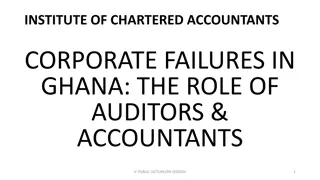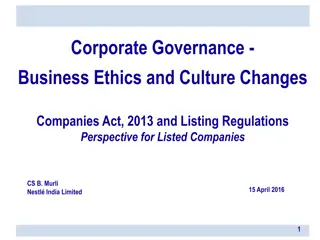Understanding Corporate Governance in Business
Corporate governance establishes relationships between a company's management, board, shareholders, and stakeholders to achieve set objectives and ensure performance monitoring. It involves factors like comprehensive reporting, international standards, and local market alignment. Entities with public accountability voluntarily comply with principles, recommendations, and guidance to foster effective governance. Key aspects include board composition, loyalty, independence, and shareholder relationships.
Download Presentation

Please find below an Image/Link to download the presentation.
The content on the website is provided AS IS for your information and personal use only. It may not be sold, licensed, or shared on other websites without obtaining consent from the author. Download presentation by click this link. If you encounter any issues during the download, it is possible that the publisher has removed the file from their server.
E N D
Presentation Transcript
Corporate governance involves a set of relationships between a company s management, its board, its shareholders and other stakeholders. Corporate Governance also provides the structure through which the objectives of the company are set, and the means of attaining those objectives and monitoring performance are determined. OECD Principles of Corporate Governance
Why? 1. Increased Demand for Comprehensive Reporting & Accountability 2. Increased International Use of Codes & Governance Disclosures 3. Trinidad & Tobago lagging significantly Key Success Factors: 1. Appropriateness for Local Markets 2. Consistency with International Standards 3. High Adoption Rate 4. Increased Awareness of Corporate Governance
Who? 1. Entities with Public Accountability How? 1. Voluntary Compliance 2. Adapt to Individual Cases 3. Apply or Explain What? 1. Principles 2. Recommendations 3. Guidance [suggestions]
1 Establish a Framework for Effective Governance 2Strengthen the Composition and Performance of Board and Committees 3 Reinforce Loyalty & Independence 4 Foster Accountability 5 Strengthen Relationships with Shareholders
4.1 The Board should promote accurate, timely and balanced disclosure of all material matters concerning the company. 4.2 Directors should state in the annual report their responsibility towards the integrity of the financial reports. This includes a statement from Directors that these reports comply with applicable financial reporting standards and present a true and fair view of the financial affairs of the company. 4.3 The Board should, on an annual basis, report to shareholders and stakeholders on the external auditor s involvement in non-audit work and fees paid to auditors. This disclosure should differentiate between fees for audit work and fees for non-audit work. 4.4 The Board should, on an annual basis, verify that the company has appropriate processes that identify and manage potential and relevant risks.
5.1 The Board should facilitate the exercise of ownership rights by all shareholder groups, including minority or foreign shareholders and institutional investors. 5.2 The Board should ensure that all shareholders have the opportunity to engage with the company and participate effectively in annual and special meetings. 5.3 During the annual and special meetings, the Board should facilitate questioning of external auditors and Senior Management by shareholders, as moderated by the chairperson.























